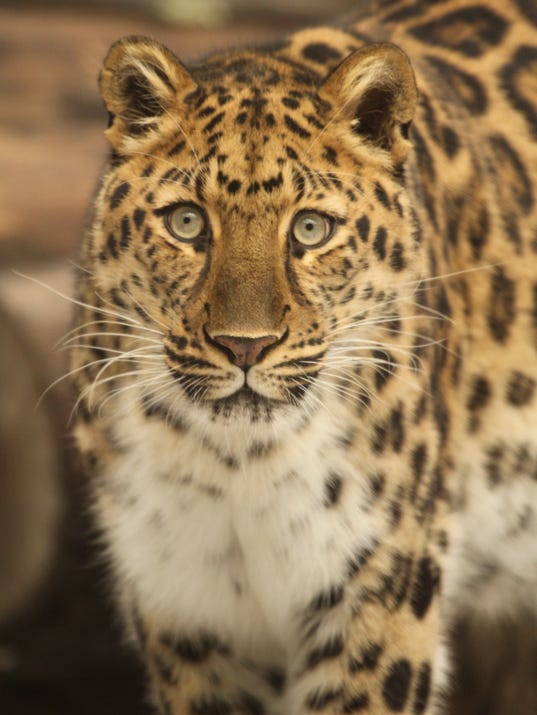The
Binghamton Zoo is honored to have a very special resident living in our
Big Cats of Asia exhibit. Kalinika the Amur leopard is one of 200 of
her kind living in captivity. Fewer than 50 Amur leopards live in the
wild, so cats like Kalinika are rare in the world. Threats to Amur
leopards include poaching, deforestation, and climate change.
Wild
Amur leopards occupy an area on the borders of China, Russia and Korea.
They like to live in cold, snowy climates, and their diet consists of
deer, badgers and other small rodents. Amur leopards have hunting skills
such as being able to leap 10 feet in the air and 19 feet forward and
being able to climb trees with freshly caught prey so that other
predators will not steal what they have hunted.
Amur leopards have
cream-colored coats with widely spaced dark rosettes. Their eyes
usually come in beautiful shades of green or blue. They can weigh
between 82 and 198 pounds and stand 18 to 30 inches tall at the
shoulder.
Kalinika is 16 years old. She came to live at the
Binghamton Zoo from the Philadelphia Zoo in February 2013. Since she has
not been at the zoo for very long, our keepers have been working to
help her become better acclimated with her new home through training and
enrichment programs.
Most of her training is done to make
Kalinika more comfortable with veterinary appointments. So far, Kalinka
has done well with targeting and keeping still in general. The keepers
are in the process of training her so that she can present her paw and
open her mouth for the vet, and sit still on a scale for her checkups.
They are also working with Kalinika so that she will become familiar
with the vet who will give her vaccines and draw blood from her tail.
In
addition to training, the keepers also conduct animal enrichment with
Kalinika. This is when they simulate behaviors that she would be using
if she were living in the wild. This includes novelty food items,
objects such as cardboard boxes and newspapers for her to tear up, and
spraying simulated scents such as animal-friendly colognes, food
extracts and other animal urines to simulate territory marking.
Kalinika
is kept on a feline meat diet. The keepers feed her 3 pounds of meat a
day on average, although this can vary depending on the season.
Sometimes, as part of her enrichment, the keepers will put frozen meat
in Kalinika's exhibit so that she can thaw it out herself. On Fridays,
she has a "Fast Day" to simulate the fact that she would not be eating
on a routine schedule if she were living in the wild. On this day, she
is given a beef bone to chew on, which is a good source of fiber for
her. Kalinika's favorite treat is raw chicken, which is given to her
during training and occasionally put into her enrichment boxes.
Some
of her favorite activities include rolling around in the grass,
shredding cardboard boxes, and trying to spy on her neighbors, the Amur
tigers. Kalinika always has an expression of pride on her face and loves
to be the center of attention, following her keepers all around her
exhibit whenever they come to work with her. Kalinika also spends the
majority of her day sleeping on either her platform or on the rocks by
the window in her exhibit. She is most active in the early morning and
late afternoon.
Feast with the Beasts
Join us for our
annual Feast with the Beasts event on Aug. 20. During this event,
guests are invited to sample different foods and beverages from local
restaurants, bakeries, specialty shops and wineries. There is also a
large silent auction and basket raffle during the event.
The fun
starts at 5:30 p.m. and lasts until 8. Tickets are $20 for zoo members
and $25 for non-members; purchase at our ticket booth or on our website
at www.rossparkzoo.com. You can even get a jump-start on bidding in our
silent auction by visiting www.32auctions.com/
binghamtonzoo.
— Written by Binghamton Zoo staff
source

No comments:
Post a Comment